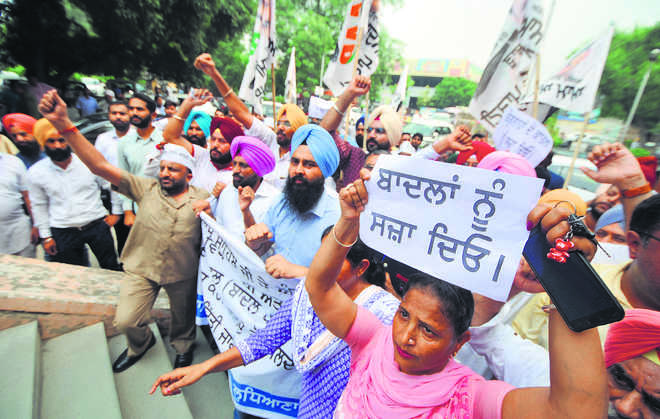
Blasphemy is a Judeo-Christian problem and a slippery one at that for the West.
Shiv Visvanathan
An academic with compost heap
One of the problems with news is that it demands an immediate response. The analysis as a result becomes knee jerk and judgements are cast in a short-term frame. Sadly, what looks decisive in the short run often looks illiterate in the long run. One needs a framework of history and philosophy to re-read a decision where, oddly, the actor and analyst become the case study. The recent decision of the Amarinder Singh government to expand the ambit of India’s desecration law to make any injury, damage or sacrilege to Guru Granth Sahib, the Bhagwadagita, the Quran or the Bible, a crime punishable by life imprisonment is worrying.
This Bill is a resurrected one. Folly often cascades into a bigger folly. In 2016 the Akali Dal government attempted to pass a Bill making any act of sacrilege against Guru Granth Sahib punishable by life imprisonment. The Bill was returned by the Centre, arguing it violated the principle of secularism. To be doubly sure, the Congress government extended the provisions to all the major sacred tests. What was excessive in an individual sense now became standardised. It was a deft move to recognise the equality of all religions.This law against blasphemy has to be read at different levels. It has to be read as a comment on democracy, religion, freedom and pluralism and one has to show it is a failure at all levels.
Democracy today has become more a concern with law and order than freedom. The democracy that we confront is the lowest common denominator democracy, swinging like a pendulum between populism and majoritarianism. The choices of governance are salutes to the gallery and lack a concern for the vitality of the difference. Law and order becomes an official duty and legislation becomes a pre-emptive exercise trying to stifle the very seeds of the problem. The problem here is not a lack of faith in religion but a lack of faith in democracy where electoral votes count more than a faith in the vibrancy of the system.
There are deeper problems. The attitude to religion is also short term. One does not see religion as a cosmology providing a way of life. The government prefers to act in terms of the homogeneity of the nation state rather than with a sense of plurality of civilisations and religions. Sikhism is one of the great plural religions with a tradition of hospitality which is vibrant. The Sikh invention of the langar expresses its hospitability of ideas in terms of food. One misses the sheer pluralism of Nanak in the responses of Amarinder Singh.
Rather than responding in a pluralistic sense, Amarinder Singh uses a law and order framework which is Judeo-Christian and alien to our society. Blasphemy has been more a Judeo-Christian problem and if one looks at history, blasphemy has been a slippery problem for Western countries.
Blasphemy arises in a starker way in monotheistic religions which claim one god and one book. To equate the Gita to the only book of the Hindus is illiteracy. It lacks a sense of civilisation and patterns all laws on the basis of a narrow Protestantism. Our governments do not seem to realise that our laws are carryovers from a colonial regime, which the West itself has abandoned.
In fact, the West took centuries to realise and reform the damage such laws have done to its fabric. Blasphemy laws in the West began as attacks on heresy and then graduated to the tyranny of the inquisition. It reminded one of the cultural revolution in China where parents and children were encouraged to denounce each other. Heresy found its deepest accompaniment in torture. When the idea of heresy gave way to blasphemy, it became symbolic of the repressiveness of courts replicating a sense of theocratic tyranny. What the West virtually abandoned over the last century, India seems to have patented. This internalisation of the laws of blasphemy is triply illiterate. It is a misreading of the history of the West. It is a misreading of the pluralism of India which has resisted monotheistic models of belief and governance. It is also sadly imitative of the fate of Pakistan. Our blasphemy laws seem to indicate a Pakistani envy, a need to be dictatorial legitimised in the garb of an intolerant religion. Intolerance through the lenses of religion has warped Pakistan as a society. It is odd that a pluralistic India suddenly envies such a forced sense of order.
There is double lack of faith here. Governments wallowing in their own electoral fragility tend to pass their anxieties on to religion, without understanding the civilisational durability and pluralistic viability of our religions. Instead of showing faith, what they actually demonstrate is a show of political correctness. The corruptibility of such a law should be emphasised. Instead of anchoring religious belief, it becomes a ritual for settling scores. The word ‘hurtful’ rather than demonstrating care, concern and sensitivity becomes a threat not to faith, but to the confidence of democracy. Amarinder Singh rather than becoming an analyst of politics becomes a prize case study of bad decision making.
One is also surprised that a country which proclaims nationalism with such fervour should be a collection of colonial hangovers. I wonder if the CM realises that he is an instrument for an outdated Judeo-Christian framework than a protector of faith.
The introduction of the blasphemy Bill in its present form increases the irony of reform, which in seeking to protect faith and democracy multiplies tyranny. As a democracy we seem to be fetishising faith and multiplying tyranny. It is time for Amarinder regime to rethink its Pavlovian response to faith and faith in democracy.



























